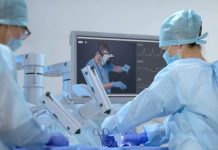
Samsung Electronics, a world leader in advanced digital component solutions, has announced PixCell LED, a new automotive LED module optimized for intelligent headlights, such as adaptive driving beam (ADB) systems.
ADB headlamps powered by Samsung’s PixCell LEDs will help improve driver visibility and safety to enhance the overall driving experience at night and in poor weather conditions such as fog or heavy rain.

“Much more than a simple automotive lighting source, Samsung’s PixCell LED is based on new lighting technology designed to improve road safety and driving convenience,” said Un Soo Kim, senior vice president of the LED Business Team at Samsung Electronics. “Beginning with PixCell LED, we will introduce tailored lighting solutions well-suited for future automobiles, including electric and autonomous vehicles.”
ADB is an advanced driver assistance technology designed to help secure maximum driving visibility. In order to prevent glare to other drivers, ADB automatically adjusts headlight beam patterns when it detects any object near a moving vehicle, thereby preventing any unnecessary glare. Recent developments in future automotive technologies, such as autonomous and connected driving, have been raising the bar for vehicle safety standards and ultimately boosting demand for ADB systems.
Leveraging Samsung’s longstanding expertise in semiconductor technology, the new PixCell LED can monolithically integrate more than 100 ultra-small segments into a single LED chip, while making the light-emitting area significantly smaller.
These LED segments are separated by a silicon wall to prevent optical cross-talk, and in turn, offer superior contrast for much greater driver visibility. Each segment functions like a pixel to meticulously control light distribution, as it distinguishes on and off areas so that the beam from the headlight only illuminates the exact location where it is needed.
With the light-emitting area shrunk to 1/16 of conventional discrete LED modules for ADB systems, the PixCell LED can reduce the headlamp size by 30-50%, allowing greater freedom in designing sleeker and more elegant lamps.
The light distribution and brightness levels of the PixCell LED are designed using automotive lighting software, making them easily adjustable to meet diverse regulations and requirements for automotive lamps around the world. Based on a single standard headlamp design, lamp makers can customize light output to suit varying design needs and enjoy reduced lead time for development, production, supply and time-to-market.
Samsung has begun shipping its PixCell LEDs to lamp manufacturers for use in next-generation electric cars and has already provided enough PixCell LEDs to light more than 300,000 electric vehicles.









